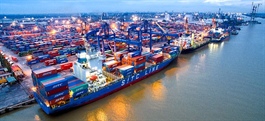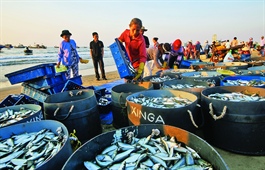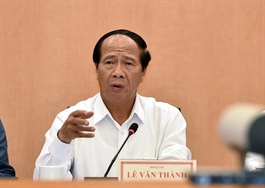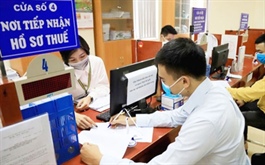Hanoi plans major infrastructure upgrade in next 10 years
Hanoi plans major infrastructure upgrade in next 10 years
Hanoi aims to realize an average GDP growth of 7-7.5% by 2025, and 7.5% by 2030.
Hanoi is planning several major projects over the next ten years to form a modern transportation and logistics infrastructure that would meet the growing demands of development in the Hanoi Capital Zone and the northern region in general.
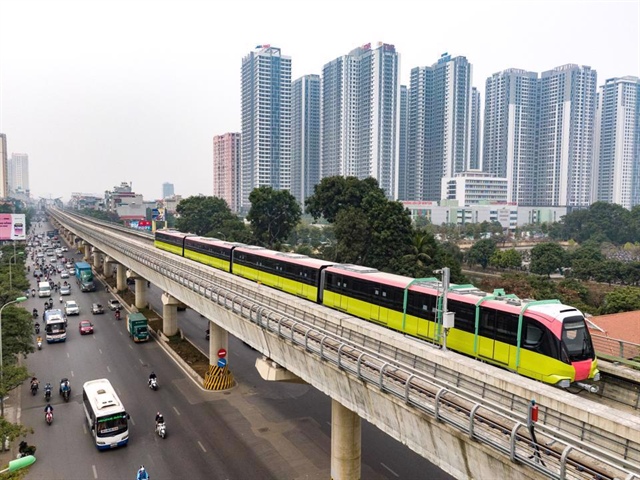
Nhon - Hanoi station urban railway in Hanoi. File photo |
The objective was mentioned in an action plan signed off by the Secretary of the Hanoi Party Committee Dinh Tien Dung to realize Politburo’s resolution on Hanoi’s development until 2030, with a vision to 2045.
Under the plan, the city is determined to complete Ring road No.4 before 2027; start the construction of Ring road No.5 before 2030; upgrade Noi Bai International Airport, and conduct feasibility for a new international airport in anticipation of rising travel demand.
In terms of urban development, Hanoi is looking at options to form new growth pillars, and gradually establish urban clusters and satellite cities based on the transport-oriented development (TOD) model.
Another priority for Hanoi is to speed up the renovation and repair of old apartment buildings, focusing on category D, the most dangerous in a four-scale classification with deteriorating conditions and inadequate services.
The action plan noted the necessity to ensure national defense, security, and public order in any circumstance; promote international integration and cooperation to enhance Hanoi’s status on the global stage; build a strong, healthy political system in Hanoi.
The municipal Party Committee called for drastic actions to refine the capital’s legal framework and policies to better reflect the next development phase, focusing on the institutional system; policies; and decentralization mechanisms.
Pushing for economic restructuring
Among the key objectives, the Hanoi Party Committee expected local authorities to raise awareness among state agencies and the public on the significant role of the capital city and the responsibility to ensure Hanoi realizes its strategic goal as the political-administrative hub, major economic, cultural, educational, technological and global integration hub of the country.
For Hanoi to continue its rapid and sustainable development, the plan suggested strong efforts to restructure the economy in line with revising the growth model. In this regard, the process should be based on promoting science, technology, and innovation, serving as the driving forces for socio-economic development.
Hanoi would speed up digitalization and the development of a digital society, and economy, along with new business models of a green-, urban-, circular, night-, and sharing economy, which should be closely associated with a shift in the labor structure.
“The city is set to complete the digital transformation in the capital apparatus by 2025,” it noted.
To realize this goal, Hanoi would prioritize the development of service sectors with high added value, such as finance, banking, insurance, and logistics; and to turn Hanoi into a leading finance-banking center in the North and the country.
Hanoi identifies the development of cultural industry, with tourism as a spearhead economic sector; promotes e-commerce activities via global chains; focuses on the construction of new industrial parks and clusters; shifts the manufacturing process from basic production/assembling toward the “Make in Vietnam” initiative of design, development, and production in Vietnam.
In terms of agricultural development, Hanoi would promote hi-tech farming based on the application of science, technology, digitalization, and automation.
Culture as a new driving force for growth
Hanoi places significance on promoting cultural development to be worthy of the city’s rich history and culture of over one thousand years old.
In this regard, Hanoi would step up efforts in building and repairing public schools to reach national standards; upgrade and preserve cultural, and historical heritage in the 2022-2025 period; promote intangible and tangible values, especially world and national heritage such as the Thang Long Imperial Citadel, Kinh Thien Palace, Co Loa, Ngo Quyen Temple, and 5,922 ranked heritages.
Hanoi is set to allocate 2% of the total budget for investment in cultural development; promote ethical education and good lifestyle among families, schools, and society, with the Human Development Index (HDI) set to reach 0.86-0.88 by 2025, and 0.88-0.9 by 2030.
Hanoi is expected to become a major center and a symbol of the country in terms of high-quality training and education, digitalization, and global integration.







